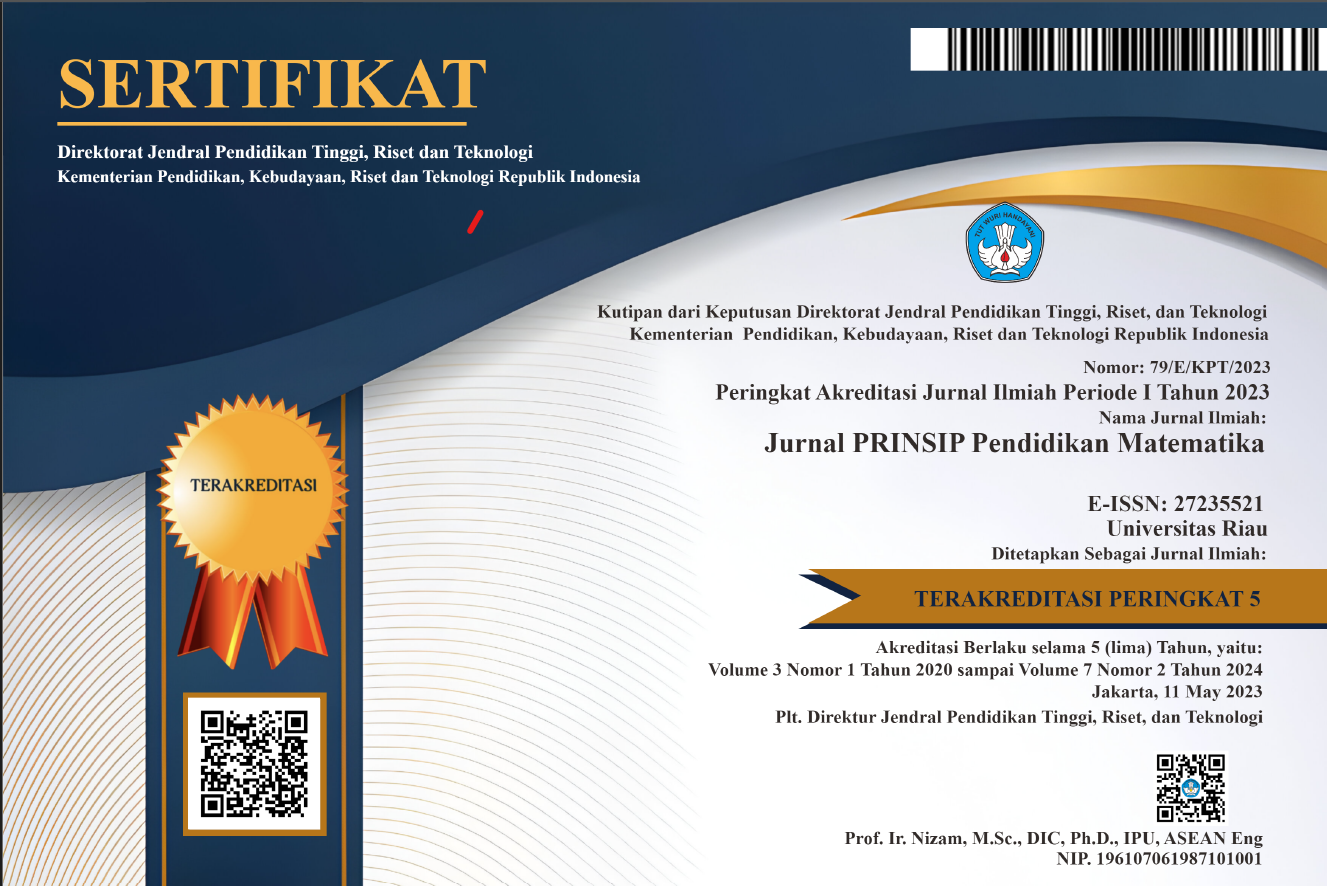DEVELOPMENT OF ELECTRONIC MODULES FOR DERIVATIVES OF ALGEBRAIC FUNCTIONS TO FACILITATE MATHEMATICAL COMPREHENSION ABILITY OF CLASS XI SENIOR HIGH SCHOOL STUDENTS
Abstract
This study aims to produce an electronic module for derivatives of algebraic functions to facilitate the mathematical comprehension ability of class XI senior high school students who have met the requirements for validity and practicality. The development model used is the ADDIE model, which includes analysis, design, development, implementation, and evaluation. The sample in this assessment is class XII MAN 2 students in Pekanbaru City. Two data collection instruments for the electronic module development are a validation sheet to see the electronic module's validity level and a student response questionnaire to see the electronic module's practicality level. Based on the validation results from three experts, it was obtained that the electronic module has an average score of 3.47 with a very valid category. The trials conducted on students were carried out twice, namely small group trials and then large group trials. Based on the results of a small group trial of students, it was obtained that the electronic module had an average score of 3.67 with a very practical category. Based on the results of a large group trial of students, it was obtained that the electronic module had a score of 3.78 with a very practical category. Therefore, it is concluded that the electronic module of derived material of algebraic functions developed has met the requirements of validity and practicality to facilitate the mathematical comprehension ability of class XI SMA / MA students.
Downloads
References
Agustin, P. R., & Yuliastuti, R. (2018). Penerapan Model Pembelajaran Pencapaian Konsep dengan Pendekatan Kontekstual untuk Meningkatkan Pemahaman Konsep Matematika Siswa. Jurnal Silogisme, 3(2), 63–70.
Aldeliana, E. (2019). Pengembangan E-Modul Berbasis Chalenging Task Untuk Meningkatkan Kemampuan Pemahaman Konsep Matematis Peserta Didik Kelas X di SMA Negeri 1 Tempilang. Universtas Islam Negeri Raden Intan.
Alzanatul Umam, M., & Zulkarnaen, R. (2022). Analisis Kemampuan Pemahaman Konsep Matematis Siswa Dalam Materi Sistem Persamaan Linear Dua Variabel. Jurnal Educatio FKIP UNMA, 8(1), 303–312.
Hamzah, A. (2019). Metode Penelitian & Pengembangan (Reseacrh & Development). Malang: Literasi Nusantara.
Kementerian Pendidikan Dan Kebudayaan Republik Indonesia. (2014). Peraturan Menteri Pendidikan Dan Kebudayaan Republik Indonesia Nomor 58 Tahun 2014 Tentang Kurikulum 2013 Sekolah Menengah Pertama/Madrasah Tsanawiyah. Jakarta: Kementerian Pendidikan Dan Kebudayaan Republik Indonesia.
Kementerian Pendidikan Dan Kebudayaan Republik Indonesia. (2016). Peraturan Menteri Pendidikan Dan Kebudayaan Republik Indonesia Nomor 8 Tahun 2016 Tentang Buku Yang Digunakan Oleh Satuan Pendidikan. Jakarta: Kementerian Pendidikan Dan Kebudayaan Republik Indonesia.
Kementerian Pendidikan Dan Kebudayaan Republik Indonesia. (2018). Peraturan Menteri Pendidikan Dan Kebudayaan Nomor 37 Tahun 2018 tentang Kompetensi Inti dan Kompetensi Dasar Kurikulum 2013 Jenjang SD/MI SMP/MTS SMA/MA. Jakarta: Kementerian Pendidikan Dan Kebudayaan Republik Indonesia.
Kosasih. (2020). Pengembangan Bahan Ajar. Jakarta: Bumi Aksara.
Nuraeni, Mulyati, E. S., & Maya, R. (2018). Analisis Kemampuan Pemahaman Matematis dan Tingkat Kepercayaan Diri pada Siswa MTs. Jurnal Pembelajaran Matematika Inovatif, 1(5), 975–982.
Prastowo, A. (2011). Panduan Kreatif Membuat Bahan Ajar Inovatif. Diva Press.
Rahmawati, N. D., & Roesdiana, L. (2022). Analisis kemampuan pemahaman konsep matematis siswa SMA pada materi turunan fungsi aljabar. Jurnal Edukasi Dan Sains Matematika (JES-MAT), 8(1), 17–32.
Sholihah, A. (2022). Pengembangan Bahan Ajar 3D Flipbook Dengan Mode IMBR (Investigastion Based Multiple Representation) Pada Materi Turunan Fungsi. UIN Syarif Hidayatullah Jakarta.
Sugiyono. (2014). Metode Penelitian Pendidikan Pendekatan Kuantitatif, Kualitatif, dan R&D. Bandung: Alfabeta.
Copyright (c) 2023 Jurnal Prinsip Pendidikan Matematika

This work is licensed under a Creative Commons Attribution-NonCommercial-ShareAlike 4.0 International License.





